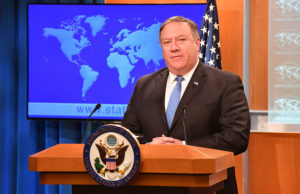
With the administration having withdrawn from the JCPOA, the nuclear deal Obama signed with Iran, there was bound to be a change. Last month, Foreign Policy’s headline described things well: “Pompeo creates new team to pressure Iran.” The so-called Iran Action Group is led by noted hawk Brian Hook, formerly the director of policy planning at State and before that a foreign policy official under Bush the Younger and on the Romney campaign.
The administration’s policy has two major prongs: first, to increase economic pressure to the maximum extent possible by the November 4 deadline it has announced for the reinstallation of sanctions on Iran. Second, it has made the major point of contention between the United States and Iran Iran itself, rather than the Iranian nuclear program.
This latter issue arose during the furor over the JCPOA. Many of the scholars and advocates who had been warning that Iran was as little as six weeks from a nuclear weapons capability suddenly decided, as it became clear that a deal was close, that the nuclear issue shouldn’t be the focus, but rather, all of Iran’s behavior that Washington opposes. The obvious effect here would have been to blow up the deal itself, since Iran was and is unlikely to simply change its perception of its interests and policies in response to American pressure. As John Glaser and I wrote at the time, the choice was never
between a neutered, Israel-recognizing liberal Iran or an empowered nuclear theocracy. It was between a nasty but weak regional power with little power-projection capability, closer or further away from a nuclear weapons capability.
By contrast, as Hook put it in an address to the Hudson Institute, “Pompeo’s goal is a comprehensive deal with Iran that addresses the full scope of its destabilizing behavior.” Since Washington views almost everything Iran does as within the “full scope of its destabilizing behavior,” unless Iran makes a 180-degree turn on nearly all of its policies overnight, there’ll be no deal absent regime change. Hook also made clear that any deal would be a treaty, which would require Senate confirmation, making the prospect even fainter, given the domestic politics of Iran and the Middle East in the Senate.
On the economic pressure side, the administration has scored some early victories, with the oil sanctions charge working better than many analysts would have predicted. Still, this leaves the ball in Iran’s court: under significant economic and political pressure, how will Iran respond? Will it try to divide the sanctions coalition and break out? Will it start enriching to 20% again, which would mean Iran is no longer abiding by the deal, as it had been? And what would happen then? With Mike Pompeo, John Bolton, and Brian Hook at the helm, there’s reason to worry.
More broadly, Nicholas Miller of Dartmouth suggests here that the Trump administration’s combination of maximal but murky demands, moderate costs imposed on Iran, and the lack of a clear and credible way out is not likely to produce Iranian acquiescence. As a consequence, Miller wonders whether the administration’s real goal is regime change. Only time will tell, of course, but given the people in charge, the situation is likely to get worse before it gets better–if it gets better.
*One final note: In the context of Trump’s latest shakeup of his foreign policy team, it bears noting that it is on foreign policy, of all places, that Trump has surrendered to the Never Trumpers by hiring one of them, James Jeffrey, now the special representative for Syria policy. This is once again an illustration of Trump’s disinterest or inability in finding GOP foreign policy hands who are likely to support the administration’s policy in areas where its dovish impulses have won out so far, such as on North Korea. There, the administration has installed Steve Biegun, a hawkish official from the Bush administration, who is likely more inclined to a Bolton-ish view of the peninsula, with the prospect for deepening the dissent within the administration on Korea policy if, and almost certainly when, the president’s bubble of optimism about the agreement pops. For a look at hawkish enthusiasm both for hawks and Never Trumpers, have a look at this Elliott Abrams piece on the Council on Foreign Relations’ blog.




